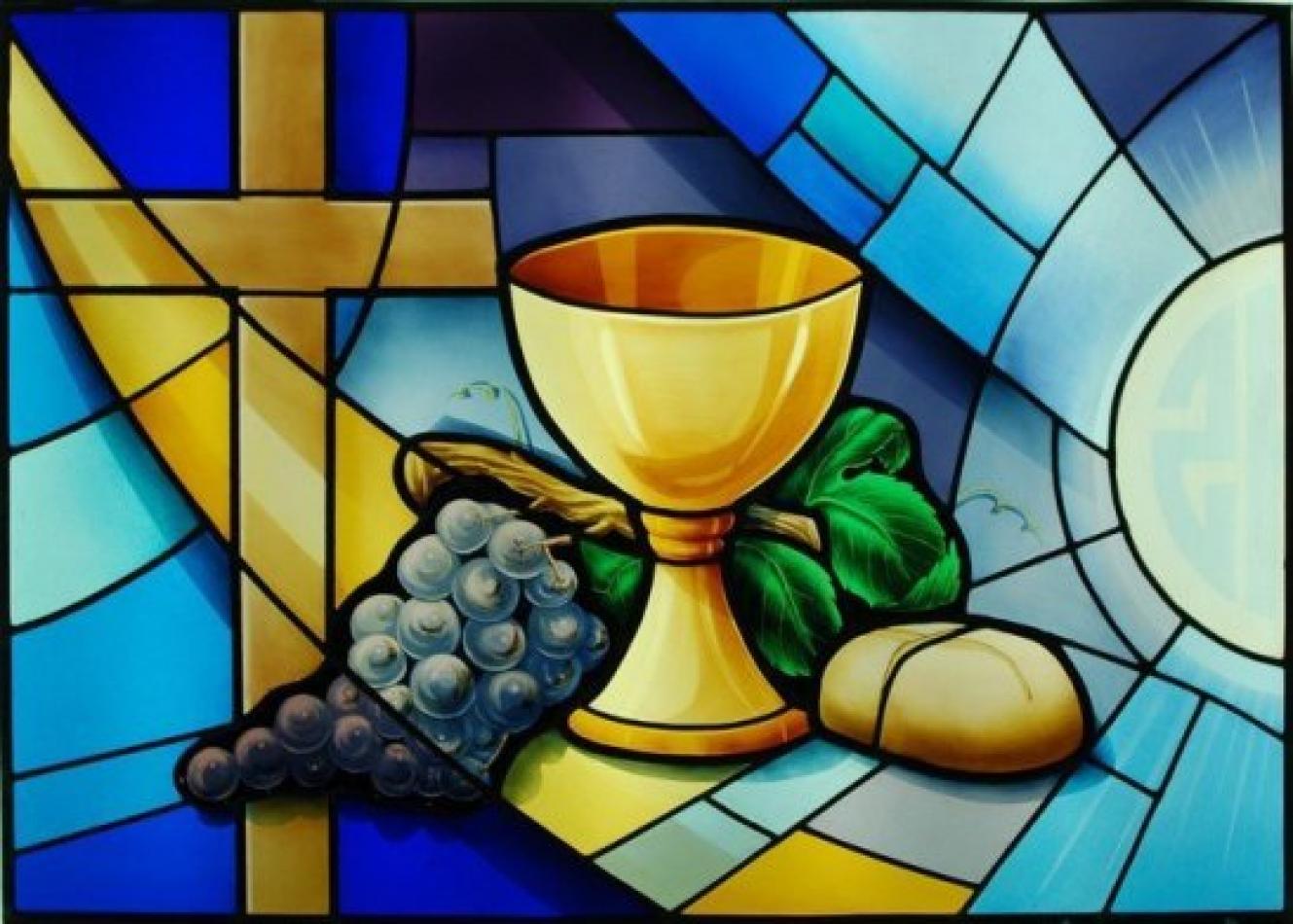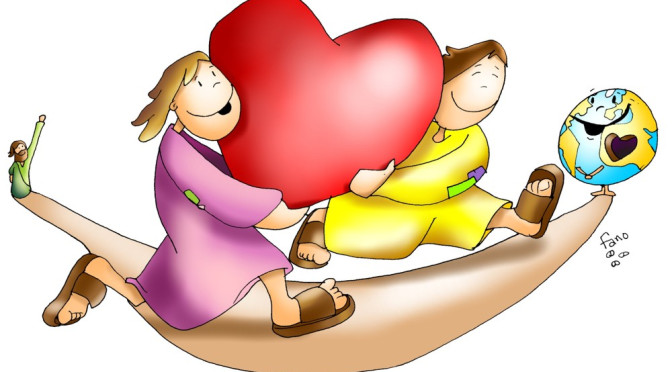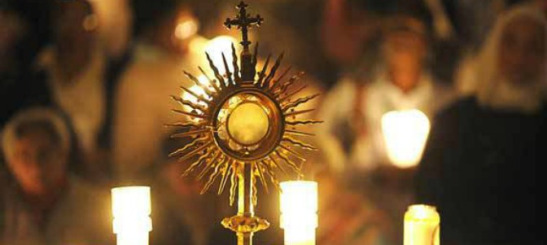Daniel Comboni
Comboni Missionaries
Institutional area
Other links
Newsletter
Jesus did not leave us a statue, a photograph, a relic. He wanted to continue to be present among his disciples as nourishment. The food is not placed on the table to be contemplated but to be consumed. Christians who go to Mass, but not receive Holy Communion, should be aware that they are not participating fully in the Eucharistic celebration.
Invited to the Banquet of the Word and the Bread
Gospel reflection – Luke 9:11-17
Fernando Armellini
Introduction
Jesus did not leave us a statue, a photograph, a relic. He wanted to continue to be present among his disciples as nourishment. The food is not placed on the table to be contemplated but to be consumed. Christians who go to Mass, but not receive Holy Communion, should be aware that they are not participating fully in the Eucharistic celebration.
The food becomes part of ourselves. By eating the body and drinking the blood of Christ we accept his invitation to identify ourselves with him. We say to God and to the community that we intend to form a single body with Christ; we wish to assimilate his gesture of love and we want to give our lives to the brothers and sisters, as he did. We don’t do this challenging choice alone but together with a whole community. The Eucharist is not a food to be consumed in solitude: it is bread broken and shared between brothers and sisters. It is not conceivable that, on the one hand, a gesture is placed that indicates unity, sharing, equality, reciprocal giving and οn the other the perpetuation of conflicts, hatreds, jealousies, hoarding of goods, overpowering is tolerated. A community that celebrates the rite of the “breaking of bread” in these unworthy conditions eats and drinks—as Paul recalls—his own condemnation (1 Cor 11:28-29). It is a community that turns the sacrament into a lie. It is like a girl who, smiling, accepted from her boyfriend the ring, a symbol of an indissoluble bond of love and, at the same time, betrays him with other lovers.
There are many ways to explain what the Eucharist is.
Paul chooses one: he says—as we have seen—its establishment, during the Last Supper. Luke chooses another one: he takes an episode in the life of Jesus—the multiplication of the loaves—and rereads it in view of the Eucharist. He uses it, that is, to make it clear to the Christians of his community the meaning of the gesture of breaking the bread that they regularly do, every week, on the day of the Lord.
If today’s Gospel passage is read as a faithful chronicle of a fact, we come across a number of difficulties: we do not understand what the five thousand men went for in a lonely place (v. 12), and no one knows even where so many people came from (v. 14). It is strange that even the fish are broken (v. 16) and we would have to explain from where the twelve baskets emerge (v. 17); had the people brought with them empty? Then the day was drawing to a close (v. 12) when the meal begins; how did the disciples arrange so many people and distribute the bread and fish in the dark?
Obviously, we are not faced with a report and it makes no sense to ask how exactly the events took place. On an event in the life of Jesus, the evangelist has built a theological reflection. Rather than piece together what happened, it is important for us to understand what is the message he wants to convey.
The first key of the reading that we insert is that of the Old Testament. The Christian communities of Luke were accustomed to the biblical language and immediately grasped allusions—that may escape us—to fact, texts, expressions, figures of the Old Testament. The account of the distribution of the loaves recalled to them:
– The story of the manna, the food given miraculously by God to his people in the desert (Ex 16; Nm 11). Also, the bread that Jesus gives comes from heaven;
– The prophecy of Moses: “He will raise up for you a prophet like myself” (Dt 18:15). Jesus who repeats one of the signs made by Moses is, therefore, the expected prophet;
– The words of Isaiah: “Why spend money on what is not food, and labor for what does not satisfy? Listen to me, and you will eat well, you will enjoy the richest of fare. The Lord of armies will prepare for all peoples a feast in this mountain” (Is 55:1-2,6);
– Finally, remember the miracle of the loaves made by Elisha (2 K 4:42-44). The miracle done by Jesus seems to be an enlarged photocopy.
These references to the Old Testament are mentioned because Luke intends to allude to them but he refers also to the celebration of the Eucharist, as it takes place in his community.
Let’s start with the first verse (v.11) that in our lectionary, unfortunately, is not quoted in full. We get back also to the part that is missing: “Jesus welcomed the crowds and began speaking about the Kingdom of God … .” Only Luke says that, when the crowds arrive at Bethsaida, Jesus welcomes them and speaks to them about the Kingdom of God. He withdraws apart with his disciples, looking perhaps for a quiet moment; but people, in need of his word and his help, join him and he welcomes them, announces the good news of the Kingdom of God and heals the sick. Welcoming means paying attention, getting involved with the needs of others, showing concern for their spiritual and material needs.
In this first verse, the reference to the celebration of the Eucharist is clear: the liturgy of the Lord’s Day always begins with the gesture of the celebrant who receives the community, welcomes, wishes peace and announces the Kingdom of God.
Like Jesus, he too welcomes all. The good, the sinners, the poor, the sick, the weak, the marginalized, those looking for a word of hope and forgiveness are welcomed; no one is turned away.
Even Paul, concluding the chapter on the Eucharist from which today’s Second Reading is taken recommends this reception to the Corinthians: “My brothers, when you come together for a meal, welcome one another” (1 Cor 11:33).
In v. 12 the hour when Jesus distributes his bread is emphasized: “the day was drawing to a close.” I noted above the difficulty of understanding this figure as an information (entirely superfluous, among others). The day was drawing to a close is instead a valuable indication and also touching. We also find in the story of the disciples of Emmaus: “Stay with us —say the two to the travel companion—for night comes quickly. The day is now almost over” (Lk 24:29). This detail tells us the time where, on Saturday night, in the communities of Luke the Lord’s Supper is celebrated.
The deserted place (v. 12) also has a theological significance: remember the journey of the people of Israel who, having left the land of slavery, started the journey to freedom and was fed with manna.
The community that celebrates the Eucharist consists of travelers who are making an exodus. They had the courage to abandon their homes, their villages, friends, the kind of life they led and they set out to listen to the Master and be cared for by him. Like Israel, they entered the wilderness, and they walked to freedom. Others—who have also heard the voice of the Lord—chose to stay where they were; they did not want to take any chances. Unfortunately for them, by doing so, they are deprived of the food that Jesus gives to those who follow him.
Jesus orders the twelve to feed the crowds (vv. 12-14). The first reaction of the twelve is amazement, surprise, the feeling of being called to a tremendous, absurd, impossible undertaking. Thus they advance a proposal that contradicts the reception implemented by the Master. They suggest to send the people home, to push them away, to disperse. Everyone thinks of solving his own problems as best he can.
The disciples do not realize the gift that Jesus is going to deliver in their hands: the bread of the Word and the Eucharistic bread. They do not understand that his blessing will multiply endlessly this food that satisfies every hunger: the hunger for happiness, love, justice, peace, the need to give meaning to life, the anxiety for a new world.
It is about the so urgent uncontrollable needs that at times push people to feed on what does not satisfy, what can actually exacerbate hunger or cause nausea. For this, the Master insists: it is from you that the world is waiting for food, you yourselves give them something to eat.
His Word is a bread that miraculously multiplies: who accepts the Gospel and nourishes one’s life with it, who assimilates the person of Christ feeding on the Eucharistic bread, in turn, feels the need to make the others sharers in his own discovery and joy. He starts to distribute also to them the bread that satisfied his own hunger. An unstoppable process of sharing is triggered and the twelve baskets of leftover remain always filled and ready for redistribution. The more people feed themselves of the bread of the Word of Christ and of the Eucharist the more the bread distributed to the hungry multiplies.
Verse 14 shows a curious detail: Jesus does not want his food consumed in solitude, each on his own, as is done at the self-service. However not even too large groups go well because they do not know each other, no dialogue. They cannot establish relations of friendship, mutual aid, brotherhood.
At the time of Luke fifty was perhaps the ideal number of members of a community. We recall that, in the early centuries, the Eucharist was not celebrated in churches, but in large halls (Acts 2:46), so the number of participants was necessarily limited. Perhaps one of the reasons of laziness, coldness, and the lack of initiative of some of the communities today depends precisely on the high number of participants.
Throughout the New Testament, only Luke uses, for five times, the Greek word (κατακλινειν) kataklinein, “lay on the table” (v. 15). It indicates the position that free people took when participating in a solemn feast. The Israelites would lie so during the Passover. It is improper to use this word in a situation like the one described in the Gospel of today, that is, to tell this to people who are in the desert, outdoors and who used to sit on the floor with legs crossed.
If Luke uses this expression, he does it for a theological reason: to allude to another meal, to that of the Christian community sitting around the Eucharistic table, the new Passover dinner, consumed by free people.
The formula that describes the multiplication of bread is known to us: “He took the five loaves and two fish, and raising his eyes to heaven, pronounced a blessing over them; he broke them and gave them” (v. 16). These are the gestures made by the celebrant in the celebration of the Eucharist (cf. Lk 22:19).
It almost seems that Luke is profaning a bit the words of the sacramental act, confounding things of the earth with those of heaven, the material needs with those of the spirit. This “mingling” of matter and spirit is not dangerous for the faith. The opposite is dangerous: unbinding the Eucharist from the lives of people, taking it among the clouds. The Eucharistic celebrations are lies when they do not celebrate the concrete commitment of all the community so that the material bread multiplies, in a way that there is enough for all and there are leftovers.
We often wonder what happened to the fish; all the attention seems focused on bread. In fact, even the fish are, strangely, “broken” and distributed together with the bread (v. 16). In the communities of Luke’s time, the fish had become a symbol of Christ. The letters in the Greek word ichthys (ικθυς) (fish) had already become the acrostic for Jesus Christ, Son of God, and Savior. The fish is then Jesus himself made food in the Eucharist.
Fernando Armellini
Italian missionary and biblical scholar
https://sundaycommentaries.wordpress.com





